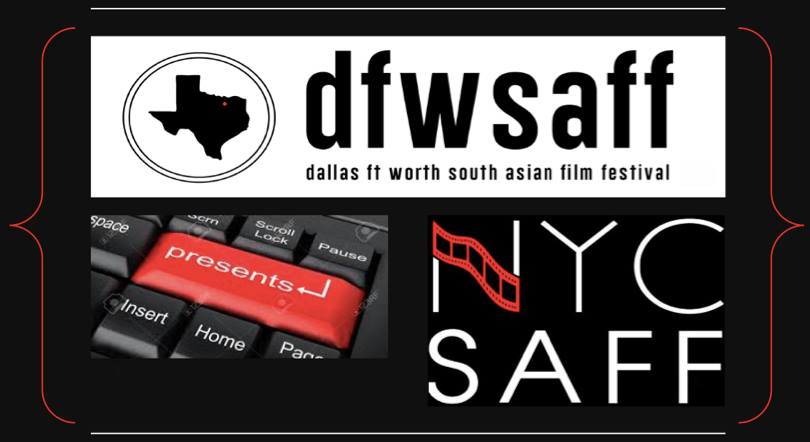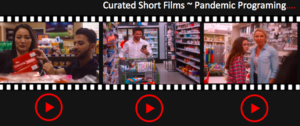
ECSA 2020 Short Film Review “The CoronaVirus Trilogy-Hoarding, Racism, & Shared Vulnerability”
WATCH PART 1 HERE
WATCH PART 2 HERE
WATCH PART 3 HERE
First, the Recap:
Situational response. Spontaneous reaction. Sudden backlash. Doors of opportunity. Crisis is never something anyone wishes to face. Yes, there are those who thrive under pressure, causing better thought, performance, and result patterns that can benefit the greater whole. However, when it comes to such events that impact an entire society, the whole world even, our nature as human beings isn’t always immediately positive.
COVID-19 is in full swing, and at a local store during the initial wave, hoarding becomes the rule, with a mother (Emily Pokora) and daughter (Emma Claire) find themselves at odds over the last bottle of hand sanitizer with another customer (Ursula Renee), leaving it up to a store worker (Nishad Nayak) to step in.
For anyone who has grabbed their goods and is ready to check out, two customers (Adrian Sanchez and Wy Renea King) allow their undisguised intolerance and misplaced bigotry to impact the Asian check out clerk (Nanae Volle), who must find relief via her manager (Fez Reh Reh), while experiencing further unwanted scrutiny from other customers (Redick Edwards IV and Kristian Peterson) while getting needed assistance from another worker (Nishad Nayak).
Meanwhile, long lines at stores threaten to cause people’s notions of social distancing to go into overdrive and raise fear about possibly getting COVID-19 from being around too many people. The solution? Two local store workers (Nishad Nayak and Mukul Vaswani) will shop for you and deliver the goods. Of course, on one local delivery to a woman (Emily Pokora), the results might not be what she hoped for.
Next, my Mind:
Roughly four hundred and one seconds, aka: just a little over six and a half minutes. Quite the truncated timetable to execute not one, not two, but THREE short films whose centralized thematic exploration of the human condition and its often overblown, completely misguided, borderline paranoid attitudes and uncertainties during times of upheaval is not only carried out in this span, but done so in a way that is equally entertaining as it is wholly necessary, absolutely realistic, and deeply convicting in causing us to look at ourselves in the mirror of our own manners and actions in how we treat others during the age of COVID-19.
The three films here, “Fight For Hand Sanitizer”, “Racism In COVID-19”, and “Social Distancing”, were a part of the “Pandemic Programming” featured at the 2020 Escapist Cinema of South Asia online film festival presented by Jingo Media and sister festivals DFW SAFF and NYC SAFF, with all of them brought to life by prolific Houston-based production company Dil Ki Baat‘s founder/writer/director/producer/cinematographer Harsh Mahadeshwar and his brilliant team of filmmakers. For this critic and the experiences in the independent film world now for over five years, the undeniable wonder of short film keeps amazing me, here being no exception, as these three glimpses into the realm of COVID-19 and its effects on us is so wonderfully, practically, executed.
Hoarding was such an unfortunate yet not entirely unsurprising aspect of our current reality when the virus really began taking hold here in the U.S., yet it was hard not to be somewhat critical of how it made people act or just feel towards each other, which is the point made in the first short “Fight For Hand Sanitizer” which portrays once such incident and the frustrated tension that ensues between those involved. Yet, situations such as this also give moments of real goodness and relevent understanding a chance to rise up, and how this film delivers that is certainly spot on and emphasizes actions that should happen more often, frankly.
Racism, specifically towards those of any kind of Asian background, is a true travesty of this time we’re experiencing, illustrated to very grounded, believable levels through the second short “Racism In COVID-19” that see an Asian store clerk become the victim of unwarranted, ill-considered harassment solely BECAUSE she’s Asian and therefore must automatically be from China where the virus began. Of course, this notion is addressed quickly and with beautiful purpose via another example of someone standing up for her and meanwhile making her accusers look foolish. Again, it’s so overtly unnecessary that we assume so much still, judge so much, by someone’s skin color when we don’t even KNOW them, and I hope the message intended here really pushes through.
Then there is the all-encompassing air of fear the virus brought and the logically needed decision that social distancing was the means by which to help combat it. Yet, in doing so, it made ANY interaction with another person seem like a potential “death sentence” as it were, with ANY cough, sneeze, or sniffle automatically being a sign a person had COVID-19. This paranoia got to almost unmanageable peaks, and also might have instilled the idea that some people were immune to getting ill. Folks, we are ALL in this together, and ANYONE can potentially get it, even with every precaution. That’s not to invoke fear, but rather a calm understanding that we ARE contained within this general scenario as a whole. I was glad to see humor used to paint a portrait of this during the finale of the third short, appropriately named “Social Distancing”.
I wish to give full credit to all the actors, a few who even took on multiple roles, for their contributions to these efforts, as no matter how brief the films might have been, performance is performance, and needing it to still be done correctly and with that sense of believability remains key, which I felt was accomplished here. So, “Bravo!” and many kudos to Nishad Nayak, Emily Pokora, Emma Claire, Ursula Renee, Adrian Sanchez, Wy Renea King, Nanae Volle, Fez Reh Reh, Redick Edwards IV, Kristian Peterson, Mukul Vaswani, and Joseph Garvasis Arakkathazath. Anyone who believes acting in any form is EASY, you’re kidding yourself, and why performances in films, no matter the length or magnitude of content, is something to be admired.
In total, “The Coronavirus Trilogy” is a film series well worth spending the six and a half minutes to view and ponder, no matter how much you might wish to feel you’ve “seen or heard it all before” at this point in the Corona pandemic. I personally have never felt consistent exposure to film efforts like this, fiction or non-fiction, that highlight some element of our real-life state of being is a bad thing. If anything, I think it is more and more imperative than ever that we get the sometimes uncomfortable reminders of just much we need to adjust our hearts, minds, spirits, and demeanors so we can actually FACE circumstances such as this as we SHOULD–as one.
As always, this is all for your consideration and comment. Until next time, thank you for reading!



